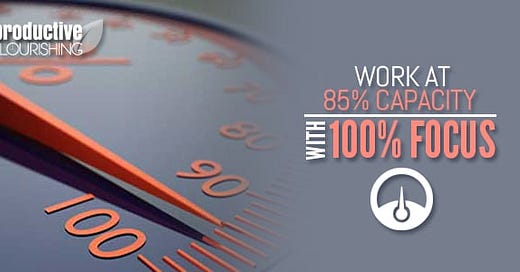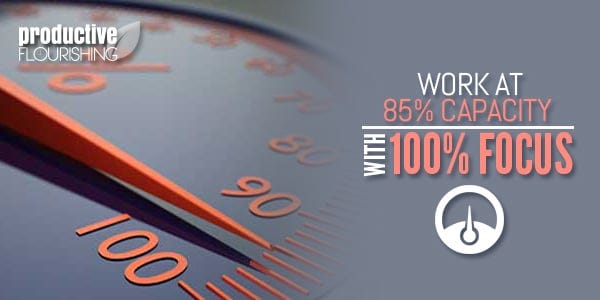Work at 85% Capacity with 100% Focus
The key to doing great creative work over the long-haul is to work at 85% capacity with 100% focus. Save a little every day so you can do more over the course of a week.
One of the chief goals of living the creative life is to do to it for the long term. There's a time and a place for sprints, but without careful integration, sprints often make your work incoherent and deplete you at the same time.
At a gut level, we know this. We understand that this is more of a marathon for us — why else invest so much of ourselves in it and dream of a life where we get to do it? But we resist the idea of the steady pace of creative productivity.
We need to reassess what it means to work at 100%. Working at 100% capacity is depleting and short-sighted, but working with 100% focus is incredibly effective, optimal, and the key to finishing your creative work. Rather than thinking about working at 100%, try to work at 85% capacity with 100% focus.
It may seem that this is giving less than everything you've got — because it is — but by keeping a little capacity in the tank every day, you can stop the sprint/crash cycle that seems to be a natural part of the creative life. Save a little every day so you can do more over the course of a week.
Capacity and Margin
One of the foundational practices that lead to creative momentum is leaving some margin. Like capacity, margin is one of those ideas that we understand but can be a bit hard to define. That makes sense, though, because margin and capacity are relational concepts: margin is the difference between your total capacity and how much of that capacity you're using.
Imagine that you have 8 hours of time to work in a given day. Those 8 hours are your (time) capacity. Planning to use every minute of those 8 hours working is not leaving any margin. Your total capacity is allocated, so if anything happens that prevents you from working those full 8 hours, you'll inevitably have to drop something you planned to do.
Consider your work patterns. How likely is it that you'll use those 8 full hours at full capacity? How likely is it that something will either interrupt or distract you? Exactly. How often, though, do you implicitly assume that 8 hours of capacity equals 8 hours of work done? Exactly. Following this same case, working at 85% capacity means assuming that you'll plan to do a little shy of 7 hours of work.
If something comes up (and it inevitably does) then you still have enough capacity to handle it and complete what you set out to do. Or if you underestimate how long something should take (and we inevitably do) you can still finish your key projects and call it a day. Side note: In case you think that the time you'll spend on a project scales with the time you have available, you might want to check out my piece on how time crunching prevents your best creative work.
As you get more in tune with your workflow, you'll also get more intuitive about what capacity means for you. Capacity is really time, energy, and attention, and it's the energy and attention that are both the hardest to quantify and the ones that are limiting factors for creative work.
Margin has the greatest effect on your energy reserves, with energy being understood as your physical, emotional, social, and mental energy. There's a reason why marathoners don't run at a full sprint; they'd never finish the race if they did. What's true of the physical is also true of the other aspects of our lives. That 15% margin gives you the additional resources to take care of yourself and continue the next day without burnout.
100% Focus: Giving Fewer Things Your Full Concentration
Let's separate focus from attention, since we sometimes use them interchangeably. By focus, I mean keeping the fewest number of things on your list as possible and making it a priority to get them done. By focusing, we stop the habit of project shuffling and instead concentrate our resources on completing projects.
If you're struggling to finish the projects you're currently working on, adding another item to the list isn't going to help you. Finishing one item on the list will.
This principle of focus works on the different levels of action perspectives. If you try to do too many tasks at once, you end up not completing any. If you try to handle too many projects in a given day or week, you end up spending a lot of time in project management mode. If you try to handle too many objectives per month, they all suffer.
The key to getting more done is to focus on completing fewer things. Imagine that you were able to complete one project a day every day. At the end of the month, that's 30 projects. How much better off would you be at that rate than you are now?
Deadlines are there to guide your project, but remember that it’s your capacity that drives your project, no matter what the deadline is.
For what it's worth, three projects a day seems to be a good, sustainable goal that balances everything that actually needs to get done with what we can do consistently. Three projects completed per day equals 90 projects per month.
Completion + Consistency = Long-Term Flourishing
Working at 85% capacity with 100% focus gets you the consistent completion that builds the type of creative life where you're not just thinking, dreaming, planning, talking, and hoping, but are actually doing.
Think about all of the creative people around you. Who are the dreamers? Who are the doers? I bet it didn't take long for you to come up with names of both. Which do you want to be?
In every domain I can think of, the people who are the most regarded are the doers. The thing that separates successful entrepreneurs and business people often isn't a killer idea; it's their execution. Successful managers actually get results. Leaders have teams that get stuff done. What separates authors from everyone else is that authors actually write books. Musicians get on stage.
The doers not only get the social rewards, but they also get the personal satisfaction of actualizing their best selves. This, of course, assumes that they aren't just mindlessly doing stuff. We become by doing, but whether we're becoming cogs or our best selves depends on how principled our actions are.
But it's not just about doing something once. It's about doing it repeatedly. If you're a regular reader of this website, you're a regular reader because you anticipate that I'll write something worth reading. Even when I miss the mark, you still hang around because you assume that the missed step was an exception to the rule.
What's true for me and the people you put in the "doer" list above is true for you. Don't just do great work once or sporadically; do it consistently, for the long haul. And do it by working at 85% capacity with 100% focus.
For more ways to build your project roadmap so capacity drives your project, read part 2 of Start Finishing.





